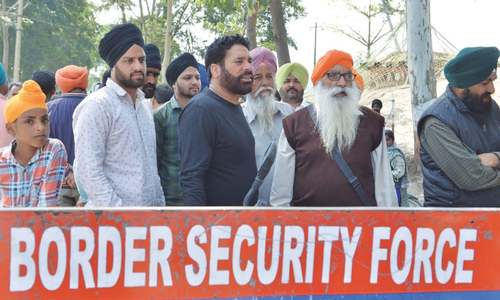Pakistan regrets India's decision to postpone upcoming Kartarpur meeting

Pakistan regrets India's decision to postpone the upcoming Kartarpur meeting [on April 2] "jointly agreed by both sides" on March 14, said Dr Mohammad Faisal, the spokesperson of the Ministry of Foreign Affairs, following a statement from India's Ministry of External Affairs (MEA) on Friday.
"The meeting was to discuss and find consensus on outstanding issues," he said on Twitter.
"Last minute postponement without seeking views from Pakistan and especially after the productive technical meeting on March 19 is incomprehensible."
Dr Faisal's response comes shortly after New Delhi said it had "sought clarifications from Pakistan on key proposals put forward by India at the last meeting held in Attari to discuss the modalities of the Kartarpur Sahib Corridor".
The statement by the Indian ministry had added that "the next meeting on the modalities can be scheduled at an appropriate time after receiving Pakistan’s response".
According to the statement by MEA, "India has shared concerns and sought clarifications on reports that controversial elements have been appointed by Pakistan to a committee to be associated with the Kartarpur Corridor." However, it did not elaborate on what 'controversial elements' it was referring to.
On Wednesday, Radio Pakistan reported that the Federal Cabinet had constituted a ten-member Pakistan Sikh Gurdwara Prabandhak Committee (PSGPC) to facilitate Sikh pilgrims after opening of Kartarpur Corridor.
Meanwhile, India has also proposed in its statement that the infrastructure development for the corridor should go forward and "in an expeditious manner."
"India has proposed to hold another meeting of technical experts in mid-April to resolve outstanding issues at the zero point agreed to at the last meeting," the statement further clarified.
According to the MEA, the Indian government "remains committed to realise the long pending demand of the Indian pilgrims to visit the holy Gurudwara Kartarpur Sahib using the corridor in a safe, secure, smooth and easy manner."
Earlier in the day, the FO had invited Indian media to apply for visas to cover the April 2 meeting at Wagha.
"Pakistan welcomes Indian media for the Kartarpur Corridor meeting at Wagah on April 2, 2019. They may apply to Pakistan High Commission in New Delhi for visas #PakKartarpurSpirit," tweeted Dr Faisal.
This was in contrast to India's refusal to allow Pakistani journalists to cover the last meeting on the Kartarpur Corridor held at Attari.
Kartarpur Corridor negotiations
The Kartarpur Corridor is expected to provide visa-free access to Indian Sikh pilgrims to the Gurdwara in Kartarpur Sahib — a small town in Narowal, 4 kilometres from the Pakistan-India border, where Sikhism founder Baba Guru Nanak spent the last 18 years of his life.
The corridor is planned to be opened for Sikh pilgrims this year in commemoration of the 550th birth anniversary of Baba Guru Nanak. The groundbreaking of the project on the Pakistani side was performed by Prime Minister Imran Khan at Kartarpur Sahib on Nov 28, 2018.
In January, Pakistan had shared its draft of Kartarpur Corridor Accord with India and invited its delegation for a visit for negotiating the document
India, however, instead of accepting the proposal on that occasion, insisted on hosting the meeting and asked Pakistani officials to visit Delhi either on Feb 26 or March 7. Although the counter-proposals from Islamabad and Delhi had given the impression of a sort of standoff on the issue, Islamabad had, instead of reacting to the position taken by India in response to its original suggestion, vowed to “take the process forward”.
Earlier this month, the Ministry of Foreign Affairs reaffirmed its commitment to continuing negotiations on proposed Kartarpur Corridor agreement and announced that the two neighbouring countries would exchange visits by their respective delegations.
The announcement came amidst an escalation of tension between the two sides with the Indian Air Force (IAF) violated Pakistani airspace following the Feb 14 attack targeting Indian security forces in Indian-occupied Kashmir's Pulwama area. Two intruding IAF jets were later downed by Pakistan and a pilot was captured only to be released as a unilateral goodwill gesture.
On March 14, officials from Pakistan and India agreed to expedite work to operationalise the Kartarpur Corridor after talks on the matter concluded on a cordial note in Attari, India.
Delegations of Pakistani and Indian technical experts met on March 19 at the the proposed zero points to discuss and finalise the development of the Kartarpur Corridor. It was decided after this meeting that both sides will present surveys and maps for border fencing and developmental work on the Dera Baba Nanak-Kartarpur Sahib corridor to their respective governments.















































